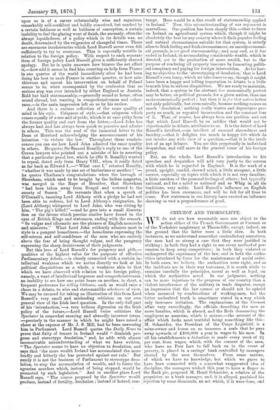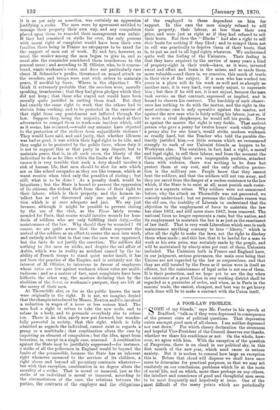CREUZOT AND THORNCLIFFE.
WE do not see how reasonable men can object to the action either of the French Government at Creuzot or of the Yorkshire magistracy at Thorncliffe, except, indeed, on the ground that the latter were a little slow. In both instances, as we understand somewhat contradictory narratives, the men had so strong a case that they were justified in striking ; in both they had a right to use every method of per- suasion to keep away competitors ; in both they violated or endangered the supremacy of the law, and in both the autho- rities interfered by force for the maintenance of social order. In both cases, we believe, the authorities were right, and as the incidents are in their way test-cases, it is worth while to examine carefully the principles, moral as well as legal, on which the authorities acted. In our judgment, nothing can be more injurious to the progress of our country than a violent interference of the military in trade disputes, except an impression that the law cannot or should not be upheld when menaced by combinations of working-men, but the latter undoubted truth is sometimes stated in a way which only increases irritation. The explanations of the Creuzot affair vary exceedingly, the officials describing the men as mere lunatics, which is absurd, and the Reds denouncing the employers as assassins, which is untrue,—the account of the affair which looks most truthful being something like this : M. Schneider, the President of the Corps Ugislatif, is a mine-owner and lessee on so immense a scale that he pays away upwards of £400,000 a year in wages to his men. /n all his establishments a deduction is made every week of 2i per cent. from wages, which, with the consent of the men, who have no Poor Law to fall back on in the event of
poverty, is placed in a savings' bank controlled by managers elected by the men themselves. From some motive, of which we have no knowledge, but which we guess to have been connected with a somewhat exaggerated idea of discipline, the managers wished this year to have a finger in the Bank pie, proposed M. Henri Schneider, a relative of the proprietor, as a bank manager, and, it is alleged, punished his rejection by some dismissals, an act which, if it were done, and it is as yet only an assertion, was certainly an oppression justifying a strike. The men were by agreement entitled to manage their property their own way, and any compulsion placed upon them to remodel their management was unfair. If they had remained on strike for ever, the only persons with moral right of complaint would have been their own families, there being in France no ratepayers to be taxed for the support of men out of work. By and bye, however, as usual, the weaker among the men began to give in, and as usual also the remainder considered them treacherous to the general cause ; and according to M. 011ivier, who, be it remem- bered, wants workmen's votes, and does not particularly care about M. Schneider's profits, threatened an armed attack on the seceders, and troops were sent with orders to maintain peace, if needful by force. Where is the objection ? We think it extremely probable that the seceders were, morally speaking, treacherous ; that they had given pledges which they did not keep ; that those who stayed out would have been morally quite justified in cutting them dead. But they had exactly the same right to work that the others had to abstain from working, and to be protected in the exercise of that right from any punishment not inflicted through the law. Suppose they, being the majority, had rushed at their adversaries to compel them to work—an incident which, odd as it seems, has oc3urred,—would any unionist have objected to the protection of the strikers from unjustifiable violence ? They would have said, and said justly, that whether idleness was bad or good, it was within their legal right to be idle, and they ought to be protected by the public force, whose duty it is not to support this or that party in any dispute, but to maintain peace, that is, in all such cases, the liberty of the individual to do as he likes within the limits of the law. Of course it is very terrible that such a duty should involve a risk of human life, that men should be shot for acts which are as like school escapades as they are like treason, which at worst receive when tried only the penalties of rioting ; but still, what is to be done As a penalty death would be iniquitous ; but the State is bound to prevent the oppression of its citizens, the violent theft from them of their right to their labour, which is their property, and the human in- " tellect has as yet discovered only one mode of protec- tion which is at once adequate and just. We say just because, although it might be possible to prevent rioting by the use of the club, as the Times lately recom- mended for Paris, that course would involve wounds for hun- dreds of soldiers who are only fulfilling their duty,—the maintenance of the law. Why should they be wounded ? Of course, we are quite aware that the ultras represent the arrival of the soldiers as an effort to coerce the men into work, and entirely admit that in that case the men were oppressed, but the facts do not justify the assertion. The soldiers did nothing to the men on strike, and despite the sad affair of Aubin, which was in reality an accident caused by the in- ability of French troops to stand quiet under insult, it has not been the practice of the Empire, and is certainly not the interest of M. 011ivier, to intervene in favour of employers whose votes are few against workmen whose votes are multi- tudinous ; and as a matter of fact, most complaints have been hitherto the other way, the masters declaring that by the abolition of the Herd, or workman's passport, they are left at the mercy of their men.
At Thorncliffe also, as far as the public knows, the men were originally in the right. It is not, we imagine, denied that the changes introduced by Messrs. Newton and Co. involved a reduction in wages of a more or less serious kind. The men had a right to refuse to take the new scale, and to refuse in a body, and to persuade everybody else to refuse too. There is an idea, rarely now put forward, but wonder- fully powerful in society, that this right, which is fully admitted as regards the individual, cannot exist as regards a group or a multitude ; that combination alters the case by importing an element of compulsion ; but the idea, apart from terrorism, is, except in a single case, unsound. A combination against the State may be justifiably suppressed—for instance, a strike of all the policemen in England would be beyond the limits of the permissible, because the State has an inherent right whenever menaced to the services of its children, a right above and beyond all pecuniary contracts whatever— but with that exception, combination in no degree alters the morality of a strike. That is moral or immoral, just as the strike. of an individual is moral or immoral, according to the .circumstances of the case, the relations between the parties, the contracts of the employer and the obligations of the employed to those dependent on him for support. In this ease the men simply refused to sell their property, their labour, at less than their own price, and were just as right as if they had refused to sell their boots. But then the "Blacks" had also a right to sell their boots for nothing if they liked; and to compel them not to sell was practically to deprive them of their boots, that is, to put an and to all legal rights whatever. We understand quite well the feeling of the Unionists. Their feeling is that they have acquired by the service of many years a kind of property-right in their work—have, as it were, invested sweat and effort and brain in the mines, and so made them, more valuable—and there is, we conceive, this much of trutlt in their view of the subject. If a man who has worked ten years in a place will do his work as well and as cheaply as- another man, it is very hard, very nearly unjust, to supersede- him ; but then if he will not, it is not unjust, because the man took service on that contract, expressed or implied, an& is bound to observe his contract. The hardship of such observ- ance has nothing to do with the matter, and the right in the most extreme case is only operative against the master, not against the new man who is fairly selling his labour, just as, if he were a rival shopkeeper, he would sell his goo.. Even as against the master the right is very feeble. That ancient person who gave a penny for twelve hours' work while giving a penny also for one hour's, would strike modem workmen as cruelly hard, but the Teacher who told tha parable dis- tinctly justified him,—.a little sermon which we recommend strongly to such of our Unionist friends aa happen to be Wesleyans also.- The outsiders, in fact, had a right, a moral and legal right, to sell their labour, and from the moment the Unionists, quitting their own impregnable position, attacked them with violence, there was nothing to be done but protect them at any cost, and the only effective protec- tion is the military one. People know that they cannot beat the soldiers, and that the soldiers will not run away, and they are saved from the danger of a useless resistance ta the law which, if the State is to exist at all, must punish such resist- ance as a separate crime. Why soldiers were not summoned before, why the attack on Thorncliffe was not prevented, we scarcely understand ; but we presume the ultimate reason was the old one, the inability of Liberals to understand that the objection to the employment of force to maintain the law has since 1832, and still more since 1867, been removed. The national force no longer represents a caste, but the nation, and its employment to maintain the law is as just as the enactment of law itself. That is very weak Liberalism which sees in such maintenance anything contrary to true "liberty," which is after all the right to make the laws, not the right to disobey them when made ; and this law, that it be lawful for a man to work at his own price, was certainly made by the people, and will be maintained by ninety-nine per cent, of them, Unionists included. The Unionists both in France and England have, in our judgment, serious grievances, the main ones being that Unions are not regarded by the law as corporations, and that they are still treated by the Press as if union were in itself an offence, but the maintenance of legal order is not one of them. It is their protection, and we hope yet to see the day when the existence of a great Union in any working district shall be regarded as a guarantee of order, and when, as in Paris in the masons' trade, the easiest, cheapest, and best way to get heavy work done will be to make a contract with the Union itself,



































 Previous page
Previous page